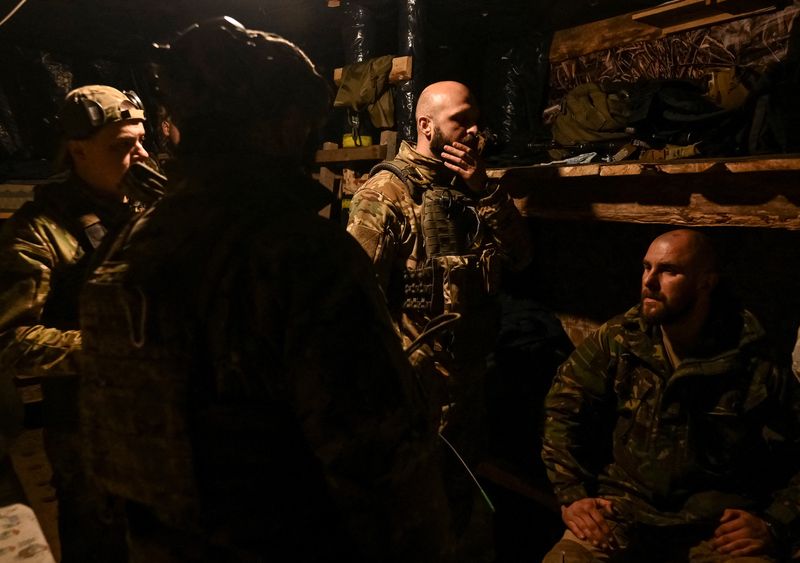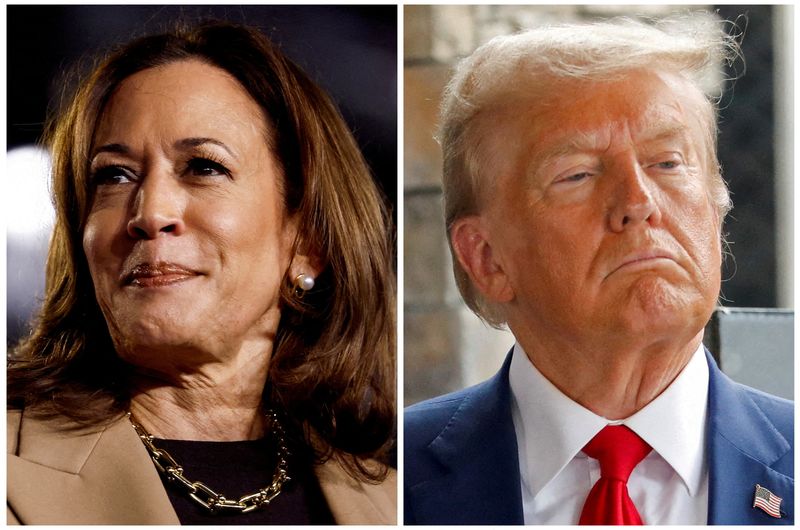By Andrew Gray, John Irish and Lili Bayer (OTC:BAYRY)
BRUSSELS (Reuters) - As Kamala Harris and Donald Trump enter the final days of their close-fought White House contest, Europe is jittery about the potential impact of the U.S. presidential election on the war in Ukraine and the continent's security.
"A half-sentence uttered in a farm in southern Idaho brings everybody from Porto to Helsinki to panic," Austrian Foreign Minister Alexander Schallenberg quipped to Reuters, urging Europeans to stay calm to avoid feeding a sense of insecurity.
Finnish President Alexander Stubb told Reuters "all of us are waiting for the elections to be over" due to their international ramifications.
When it comes to Ukraine and European security, many European officials say they are worried about a win for Republican former President Trump on Nov. 5, given turbulent transatlantic relations in his previous term, his past strong criticism of NATO and his ambivalent view of Kyiv's fight against Russia's invasion.
They say any end to the Ukraine war that Vladimir Putin sees as a victory could embolden the Russian president to attack a NATO country. A German spy chief warned this month Russia could be in a position to do so by the end of the decade at the latest.
Putin has denied he has any intention of attacking a NATO country.
In recent weeks, Reuters spoke with more than 20 senior European officials about the impact on Ukraine of the U.S. vote. Many spoke anonymously to discuss a vital ally. One theme dominated their comments: Uncertainty, fuelled by what they cited as Trump's unpredictability during his 2017-2021 first term.
Together with the Biden administration, European officials have implemented measures they say should soften the blow of any quick withdrawal of U.S. aid to Kyiv were Trump to take office in January, including a $50 billion loan to Ukraine and a rejig of military aid coordination.
Those would be only a temporary reprieve for Kyiv, however.
Harris, the Democratic candidate and President Joe Biden's vice president, is widely expected to keep supporting Ukraine while seeking to avoid escalation if she wins the election.
Harris has been strongly critical of Putin and has said that if she wins she will work to ensure Kyiv prevails in the war and achieves a just peace, although she has not set out a detailed Ukraine strategy.
Trump has said that if he wins on Nov. 5 he could end the war in a day, before even taking office. He has not said how he would do so.
He has also criticised the amount of U.S. aid given to Ukraine, has repeatedly called President Volodymyr Zelenskiy "the greatest salesman on Earth" and this month accused him of helping start the war, even though the conflict broke out after Russia's full-scale invasion of Ukraine in February 2022.
Trump added, "that doesn't mean I don't want to help him because I feel very badly for those people".
In response to a request for comment for this story, Karoline Leavitt, a Trump campaign spokesperson, said: "When President Trump was in office, NATO was strong, there was no war in Ukraine, and the Middle East was stable."
She said Trump would "restore world peace through American strength and ensure European nations carry their weight by paying their fair share to our mutual defense to lighten the unfair burden on American taxpayers".
TOUGH MOMENT FOR KYIV, ALLIES
The tight U.S. election race comes at a tough moment for Kyiv and its European backers.
Moscow’s forces are advancing in eastern Ukraine. A harsh winter looms after massive Russian attacks on energy systems.
Domestic political troubles weigh down German Chancellor Olaf Scholz and French President Emmanuel Macron. Public finances are tight across the continent. Russia-friendly populist parties have scored election successes in recent months in the European Parliament, Austria, and eastern Germany.
"The longer it (the war) lasts, the harder you have to work to maintain support for it because the more there will be voices that say: 'Why are we prolonging this conflict? It’s a huge meat grinder,'" said a senior diplomat from a NATO country.
The main measure that Europeans hope would cushion Ukraine from any sudden U.S. policy change is the G7 loan of $50 billion, using profits from frozen Russian assets.
The loan - details of which were agreed last week - should allow Kyiv to keep buying arms even if American aid is cut.
"The G7 $50 billion for Ukraine is really important," said a Western official. "Get that done and I think Ukraine is really fairly well set for 2025."
NATO, meanwhile, is setting up a command to coordinate military aid for Ukraine, taking over much of the work of a U.S.-led ad-hoc coalition.
Officials say putting the effort under a NATO military structure insulates it from sudden political change. But it is far from bulletproof, given the U.S. is NATO's dominant power.
TRUMP APPEAL
In public comments, European officials are aiming to influence Trump and his supporters by declaring that a victory in Ukraine for Putin would make the U.S. look weak and embolden both Russia and China to challenge American power.
NATO boss Mark Rutte declared this month that Trump understands the war "is not only about Ukraine, it's also about the safety and the future security of the United States".
Trump and Harris met Zelenskiy separately in New York in September.
The Ukrainian leader has not publicly favoured either candidate, but said after the meetings it was important "America has a direct understanding of Ukraine" and that the war "must be stopped with fairness, so that no aggressor will ever do what Russia is doing".

Not all European leaders are nervous about Trump. Hungarian Prime Minister Viktor Orban, a Trump ally, opposes military aid to Ukraine and has made clear he thinks Trump shares his views.
Some Ukrainian and Eastern European officials, by contrast, speculate Trump might cross red lines set by Biden by giving more long-range arms and ending a ban on striking deep inside Russia - if Putin refused or reneged on any deal he offered.
